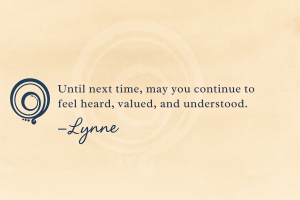Dear Therapist, sometimes my anxiety gets so bad I feel frozen and my thoughts race. When I get like this I can’t seem to get myself to snap out of it and I end up wasting time. What can I do so my anxiety doesn’t get the best of me?
-Anxious reader
Dear Anxious Reader,
Thank you for sharing what your anxiety feels like. You’re not alone, many people describe feeling frozen, overwhelmed, and unable to “snap out of it.” When anxiety spikes, your body’s natural “fight, flight, or freeze” response is activated, and sometimes freeze takes over as a way of protecting you. This can feel exhausting because your nervous system is running in overdrive, even if you’re not physically doing much, your mind is working overtime.
The good news is that there are skills you can use to interrupt this cycle and help your body and mind return to calm. Here are a few that are usually easy to practice almost anywhere:
Grounding Skills
- Plant your body: Press your feet into the floor or your back into the chair to reconnect with the present moment.
- Square breathing: Inhale for 4, hold for 4, exhale for 4, hold for 4. Repeat a few times.
- Body scan: Slowly bring attention from your feet upward, noticing sensations without judgment.
- Gentle movement: Stretch, walk, or do light exercise to release tension.
Use Your Senses
- 5-4-3-2-1 method: Name 5 things you see, 4 you feel, 3 you hear, 2 you smell, 1 you taste.
- Color hunt: Pick a color and find objects in your environment that match.
- Temperature shift: Splash cold water on your face or run wrists under cool water.
- Music therapy: Play songs that soothe or uplift you, consider creating an “anxiety playlist.”
Mental Grounding
- Visualization: Imagine a safe, peaceful place and engage all your senses in that scene.
- Affirmations: Write calming phrases on cards to keep handy, like “This will pass,” “I am safe,” or “This is anxiety, not danger.”
- Mind games: Distract and refocus by naming items in a category (foods, cities, animals, etc.).
Practice Ahead of Time
Think of these skills as building a toolbox. Just like exercise, they’re most effective when practiced regularly, not only in the middle of a crisis. Try one or two techniques daily so they’re easier to access when anxiety creeps in or when you know a stressful situation is coming.
A Final Note
If you notice anxiety interfering with your ability to live daily life, reaching out to a therapist can provide extra support and a personalized plan. Most importantly, be kind to yourself. You are doing the best you can, and with practice, you can train your nervous system to move through anxious moments with more ease and less fear. Anxiety doesn’t define you; it’s something you can learn to manage.

This column is for informational purposes only and is not a substitute for professional mental health care. Reading this does not create a therapist-client relationship. If you are struggling with anxiety or another mental health concern, please reach out to a licensed professional in your area for support. If you are in crisis or thinking of harming yourself, please call 988 in the U.S. or go to your nearest emergency room.